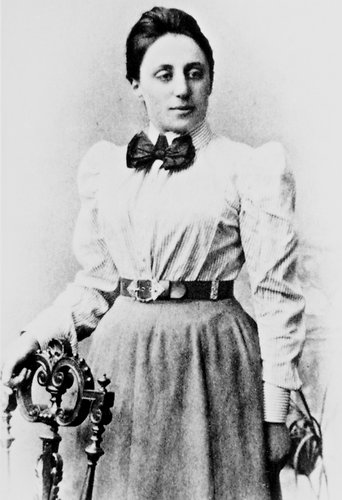Winner of the Spring 2019 StMU History Media Award for
Best Overall Research
In patriarchal societies, men limit the aspirations that women have, from how women are allowed to express themselves, to how women are allowed to pursue their livelihoods. One woman who faced these limits was the German-Jewish woman Emmy Noether. Noether’s passion was mathematics. She loved the world of mathematics, and she sought to make mathematics her career, at a time and place where women were largely excluded from such ambitions. German universities at the turn of the twentieth century were bastions of elite academic males. So how did this woman overcome those obstacles to her aspirations and succeed in becoming one of the most renown female mathematician of her age? Ironically, it all started with a man: her father.
Emmy Noether fell in love with mathematics because her father, Max Noether, was a mathematics professor at the University at Erlangen in Germany, where Emmy later started her own undergraduate studies.1 Max Noether’s research in algebraic-geometry studies ignited Emmy Noether’s passion for mathematics, and was the catalyst for her decision to go to college to study mathematics. And there, at her father’s university, she began her undergraduate studies in the year 1900.

In the early decades of the 1900’s, including the field of mathematics, it was rare for women to become students or faculty in Germany’s educational institutions.2 But Emmy gained acceptance to study mathematics, and after two years of her studies as an unclassified student, she excelled in the examination that allowed her to start her doctoral work as a matriculated student.3 Noether had also begun giving lectures and teaching with her father at the University of Erlangen, as an unofficial professor without pay and under the name of other official professors. For the next thirty years, her career consisted of pursuing research under her father’s wing and continuing on as a teaching assistant, being one of the few women in the department.
In 1930, Noether moved her research to Göttingen University, where she focused on commutative number fields, non commutative algebra, and linear transformations with Professor Helmut Hasse. As her research continued to expand, Emmy converted “algebraic number fields into theorems for ideals in arbitrary integral domains (and rings in general)” where the “ideals in rings” was introduced.4 Due to the new discoveries that were made, new ideals on elimination and algebraic varieties theories also took a new step for history.
One of her many well-known accomplishments in the mathematics field is the Brauer-Hasse-Noether Theorem, where she worked with fellow mathematicians Kurt Hensel and Richard Brauer in quantitative research. Their main idea of work in Cyclic Algebra was known as the “Proof of a Main Theorem in the theory of algebras,” and in November of 1931, their proof added its last addition of work.5 In Emmy’s contribution to the Theorem with Hasse and Brauer, she submitted what is known as “Emmy’s Method,” which is the reduction method that affected the collective theorem of cyclicity.

“Als Eingangsdatum erschien in der publizierten Arbeit der Tag, an dem das Manuskript bei Emmy Noether eingetroffen war.” This translates to “The date of publication in the published work was the day on which the manuscript was entered by Emmy Noether.”6 The quote is from the documented historical letter, “Anmerkungen zum Dokument vom 6.10.1927,” from Hasse and Noether in most of their timeline of research. Emmy Noether had a contribution of letters that were submitted for the Annals of Mathematics, yet she had been classified as an unofficial writer for the document itself.
Although her earlier contributions were not recognized or acknowledged, Noether’s work over the years all contributed to Emmy Noether being the first woman and the tenth honoree to ever receive the Ackermann-Teubner Award. This esteemed award, which she received in 1932, had been created as a way to recognize the analysis of mathematics and scientific work through research and published papers.7 Emmy Noether had received recognition as a history-making woman mathematician, and receipt of this award gave more acknowledgement to her algebraic theorem contributions to the world of mathematics. Events such as these allowed the awareness of her work to expand beyond the university, and her limitations as a woman mathematician began to decrease. Yet that was just about to change in 1932, as the Nazi Party in Germany climbed ever higher in each of the four elections that were held that year. Her position as a woman academic in a Nazi-controlled Germany started receiving negative attention. And the Nazis took the lead in harassing not only women academics, but especially Jewish women academics.
In January 1933, Adolf Hitler became German Chancellor and the Nazi Party then gained power throughout Germany. Educational institutions throughout Germany were affected by the changes of this new Germany, including the discipline of mathematics, where “the treatment of mathematicians of ‘unfavorable ethnicity’ like Jews” was now receiving increased scrutiny.8 This affected mathematicians at the University at Göttingen, where Emmy Noether faced increasing harassment for not only being a woman mathematics professor, but especially for being a Jewish professor teaching “Aryan” students. Even before the Nazi seizure of power, students, faculty, and staff in universities throughout Germany had been subjecting Jewish professors to a wide range of disrespectful behaviors. But now that the Nazis were completely in power, the disrespect escalated to outright harassment of Jewish students and Jewish professors, no matter who they were.9

The harassment of Jewish academics was followed up with new laws affecting all schools throughout Germany. Jews were forbidden to work at or attend schools meant for Aryan students. As a consequence of these actions and laws, many Jewish professors left their universities, left Germany, and immigrated, many of them making their way to the United States. This was especially true for Jewish mathematicians. Emmy Noether was one of dozens of professors forced to leave her career and leave her research in April of 1933.10
As this happened, Jewish academics “managed to keep contacts with Jewish mathematicians who were forced to immigrate” through journals.8 These journals retained possession of records and information on the people that had been enforced due to the Anti-Semitism Movement. In time, the Law of Restoration in 1933 established the dismissal of all Jews from Academic contributions and activity. Slowly the participation of Jewish scholars in Germany society began to decrease. The Nazi regime restricted employment opportunities for Jews and significant limited the freedom and rights of Jewish people for the foreseeable future.

Noether lived through these early months of the Nazi regime. She faced discrimination during and after her dismissal from her university work in April 1933. Months later, Noether had the option to go to Moscow with some of her fellow Jewish friends, but decided to immigrate to the United States, where she was offered a position to teach mathematics at Bryn Mawr College in Pennsylvania.12 In her new environment, Emmy Noether not only lectured her own classes and continued her algebraic research, but she taught and worked with other women for the first time. For three years after her arrival in the United States, she made many friends and continued to write letters to her brother Fritz Noether and her former colleague Helmut Hasse, from Göttingen, until her sudden death in 1935 from illness.
At her funeral at Bryn Mawr, she was finally acknowledged for her scholarly work in the Mathematical Annal by Hermann Weyl, and she was remembered for her dedication to her theorem discoveries with various professors, including Hasse and Brauer. Even before her time at Bryn Mawr, Noether knew that her “methods are working, conceptual methods and therefore have anonymously penetrated everywhere,” even in the early stages of her successful research.6
During times of trial, acceptance, denial, and discrimination of different kinds, like millions of women throughout history, Emmy Noether lived decades of her life fighting and beating discrimination for her being a woman. Women like her had long been limited in how they could be involved in politics and family planning. And in Emmy Noether’s case, these women were limited in their education opportunities. Specifically, by living in Germany and being born as a woman, education and employment opportunities were very limited, yet Emmy Noether spent her life defeating the odds by becoming a renowned woman mathematician, who went to college, received her doctorate degree, and completed and published research in a male dominated culture. Noether survived the discrimination of the Nazi regime and made history as a woman mathematician. Noether’s mathematical theorems are foundational to what students are taught in today’s classrooms because of her dedication and determination to be in the field of mathematics. She has left a lasting contribution to the mathematical theories that we still use today.
- Jose Ignacio Cogolludo-Augustin and Miguel A. Marco Buzunariz. “The Max Noether Fundamental Theorem is Combinational,” University of Zaragoza (February 2010): 1, https://www.researchgate.net/publication/45900664_The_Max_Noether_Fundamental_Theorem_is_Combinatorial. ↵
- Peter Roquette and Franz Lemmermeyer, Helmut Hasse Und Emmy Noether, Die Korrespondenz 1925 – 1935 (Universitätsverlag Göttingen, 2006), 34, http://www.oapen.org/search?identifier=610183. ↵
- Alice Silverberg and Dirk Huylebrouck. “Emmy Noether in Erlangen,” Mathematical Intelligencer 23, no. 3 (Summer 2001): 23, https://www.researchgate.net/publication/226231187_Emmy_Neother_in_Erlangen. ↵
- Emmy Noether, Ideal Theory in Rings (Idealtheorie in Ringbereichen), (University at Erlangen, October 1920), https://arxiv.org/abs/1401.2577. ↵
- Peter Roquette et al., Helmut Hasse und Emmy Noether, Die Korrespondenz 1925 – 1935 (Universitätsverlag Göttingen, 2006), 34. http://www.oapen.org/search?identifier=610183 ↵
- Peter Roquette and Franz Lemmermeyer, Helmut Hasse Und Emmy Noether, Die Korrespondenz 1925 – 1935 (Universitätsverlag Göttingen, 2006), http://www.oapen.org/search?identifier=610183. ↵
- A Biographical Encyclopedia, 2002 s.v. “Noether, Emmy (1882–1935),” by Hugh A. Stewart. ↵
- Stana Remus, “Mathematics in Nazi Germany,” (University of Glasgow, 2009): 1, 5, https://www.gla.ac.uk/media/media_338601_en.pdf. ↵
- Stana Remus, “Mathematics in Nazi Germany,” (University of Glasgow, 2009): 1, https://www.gla.ac.uk/media/media_338601_en.pdf. ↵
- Stana Remus, “Mathematics in Nazi Germany,” (University of Glasgow, 2009): 1, 5, https://www.gla.ac.uk/media/media_338601_en.pdf. Stana Remus states: “In total 145 mathematicians in academic positions were forced to leave Germany and this list includes Emmy Noether, Richard Courant and Hermann Weyl. Their main destination was the United States of America, where 82 of the 145 went, leading to America becoming the world centre of mathematics.” ↵
- Stana Remus, “Mathematics in Nazi Germany,” (University of Glasgow, 2009): 1, 5, https://www.gla.ac.uk/media/media_338601_en.pdf. ↵
- A Biographical Encyclopedia: Women in World History, 2002 s.v. “Noether, Emmy (1882–1935), by Hugh A. Stewart. ↵
- Peter Roquette and Franz Lemmermeyer, Helmut Hasse Und Emmy Noether, Die Korrespondenz 1925 – 1935 (Universitätsverlag Göttingen, 2006), http://www.oapen.org/search?identifier=610183. ↵



66 comments
Amanda Quiroz
Such a strong woman with a great passion for mathematics. I love how she was able to overcome obstacles during such a difficult time. Also, because she was able to contribute as a woman. Most women at the time were sort of in the shadows of men so the fact that she could live up to her passion without limiting herself is amazing.
Cassandra Sanchez
I remember briefly learning about Emmy Noether and her contributions to the world of mathematics and I find it very interesting how she accomplished so much despite going through many difficulties in Germany and being dismissed from her work to moving to the United States and a completely different lifestyle than what she may have been used to. It is really nice to see how even through all of the discrimination she faced, all her hard work eventually paid off and she finally received credit for everything she accomplished.
Doan Mai
The article is fascinating to read. Emmy Noether is such a well-inspired woman. She had proved that women could do things that men can do, and that showed sex equality. It was a good thing that at last, she got the credits for all of her hard work after working without receiving any credits for so long.
Stephanie Cerda
I’ve never heard about Emmy Noether which is really sad, and shows how she really faced discrimination. It’s great to see that her work ultimately reflects in today’s mathematics, and shows how she really made an impact in the world. Her story is really impressive and motivating. She was highly dedicated to her work, and she should be known more, especially with her equally as high discoveries and contributions.
Arturo Canchola
It is disheartening to hear that in just under one-hundred years ago, women were treated as inferior to men in the field of science and mathematics. Given the current state of society we live in today, it is difficult for me to even fathom this concept. The amount of dedication and bravery it took for women like Emmy to work in the field — despite the opinions of their colleagues — is truly a testament to their impact as both a professional and as women.
Joanna Martinez
I enjoyed this article very much and appreciated the fascinating topic of women in the math field and the detailed description of the obstacles that women were forced to obtain during Emmy Noether’s time. I found it very interesting that her father was the person to push her to become a mathematician considering society’s view on women in the field of mathematics. The structure of the story allowed the emphasis of the meaning to be illustrated throughout its entirety.
Samantha Bonillas
Before reading this article, the name Emmy Noether did not ring a bell. Her life, in this article is very descriptive. Her perseverance to pursue a male dominated profession/expertise during that time period was difficult for women. Emmy Noether was a Jew who wanted to pursue a career in mathematics. During this time period, women would not receive a lot of credit for what they deserved because it was the stereotype in place that was that men had the dominance of bringing in money and discovering new things while women stayed at home and took care of the chores and children.
Samantha Bonillas
Before reading this article, the name Emmy Noether did not ring a bell. Her life, in this article is very descriptive. Her perseverance to pursue a male dominated profession/expertise during that time period was difficult for women. Emmy Noether was a Jew who wanted to pursue a career in mathematics. During this time period, women would not receive a lot of credit for what they deserved because it was the stereotype in place that was that men had the dominance of bringing in money and discovering new things while women stayed at home and took care of the chores and childre.
Zoe Peña
It is fascinating for me to learn about the experiences women went through barely even 100 years ago. It seems like a large number, but the reality is that it was only a short period of time ago that women like Emmy didn’t get paid to teach, lost their jobs for no good reason, and other hardships to do things they love and also really good at.
Zoe Peña
It is always an interesting read for me to learn about the experiences women went through barely even 100 years ago. It seems like a large number, but the reality is that it was only a short period of time ago that women like Emmy didn’t get paid to teach, lost their jobs for no good reason, and other hardships to do things they love and also really good at.